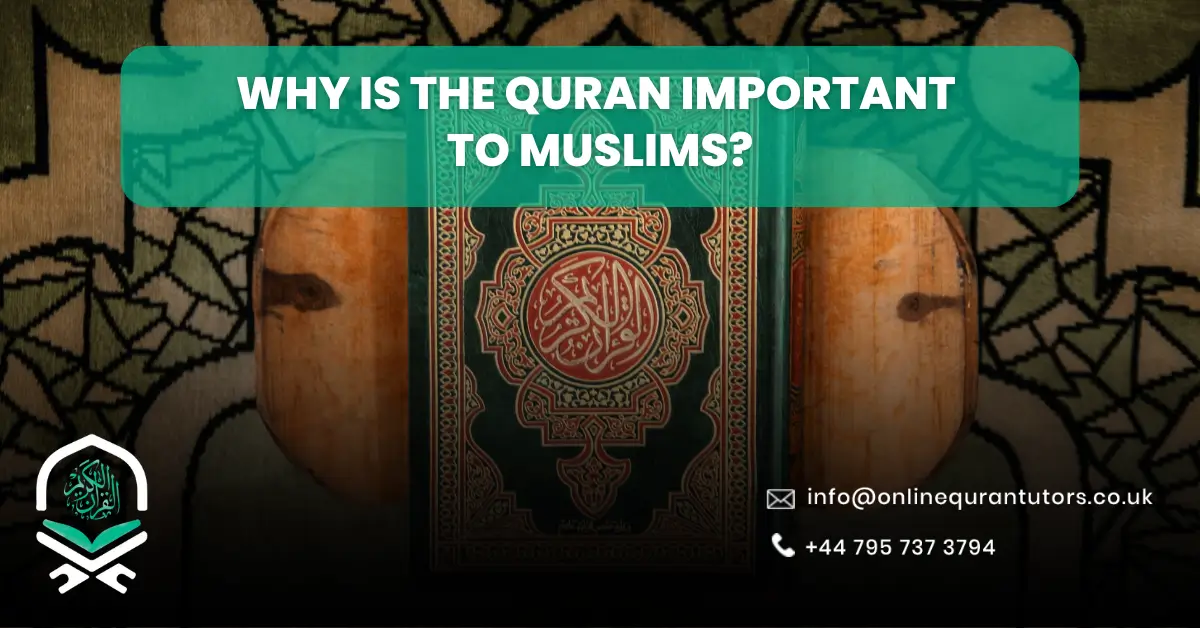In a world full of distractions and shifting values, many people—Muslims and non-Muslims alike—find themselves asking: Why is the Quran important to Muslims? The answer lies in the Quran’s timeless role as both a spiritual and practical guide. It addresses the needs of the human soul and the realities of daily life, offering direction to people of every culture, status, and era.
More than just a religious text, the Quran provides universal teachings that shape personal conduct, social interactions, and moral decisions. It illuminates the path toward the Hereafter while offering wisdom for how to live meaningfully in this world.
In Islam, the Quran holds unparalleled importance. It is the final revelation from Allah SWT, and Prophet Muhammad PBUH was its living example, demonstrating through his life how its teachings should be applied in practice. His character, compassion, and justice were a direct reflection of the values found within the Quran.
By engaging with the Quran daily—through recitation, reflection, and understanding—Muslims find peace, purpose, and spiritual clarity. This connection becomes especially powerful during the month of Ramadan, when hearts turn more fully toward its divine message.
Allah SWT highlights the Quran’s essential role in our lives, saying:
“This is a blessed Book We have revealed. So follow it and be mindful ˹of Allah˺, so you may be shown mercy.” (Surah Al-An’am 6:155)
He further states:
“There certainly has come to you from Allah a light and a clear Book, through which Allah guides those who seek His pleasure to the ways of peace, brings them out of darkness and into light by His Will, and guides them to the Straight Path.” (Surah Al-Ma’idah 5:15–16)
These verses remind us that the Quran is not just for recitation—it’s a living guide for those who seek light, truth, and purpose in their lives.
The Importance of the Quran in Islam
What is the importance of the Quran in our life as Muslims? The answer lies in its divine guidance, moral clarity, and spiritual depth. The Quran is not just a religious scripture—it is a complete way of life. It contains foundational principles of belief, practice, and ethics that, when followed, lead to the ultimate well-being and success of individuals and society as a whole.
Allah SWT demonstrated the Quran’s practical application through His final Messenger, Prophet Muhammad PBUH, who embodied its teachings in every aspect of his life. The Prophet was not just a transmitter of revelation—he was its living example. Allah SWT confirms this in Surah Al-Ahzab:
“Indeed, in the Messenger of Allah you have an excellent example for whoever has hope in Allah and the Last Day, and remembers Allah often.”
(Surah Al-Ahzab, 33:21)
The Prophet’s life reflected the Quran in action, giving Muslims a clear path to follow in order to live righteously and meaningfully.
Also Read: Essential Quran Tajweed Rules You Must Know
The Importance of the Quran and Sunnah
Understanding the Quran cannot be separated from the life and teachings of the Prophet Muhammad PBUH. Together, the Quran and Sunnah form the primary sources of Islamic guidance. The Sunnah (traditions and practices of the Prophet) complements the Quran by demonstrating how its commandments should be implemented in real-life situations.
One of the most profound descriptions of the Prophet’s character comes from a hadith narrated by Yazid ibn Yabnus. He once asked Aisha (RA), the wife of the Prophet and a leading figure in Islamic scholarship:
“Umm al-Mu’minin, what was the character of the Messenger of Allah like?”
She replied, “His character was the Quran.”
This powerful statement reflects how the Prophet PBUH did not merely recite the Quran—he lived it. His actions, speech, and decisions were all inspired by divine revelation.
For Muslims striving to lead a righteous life, this means that the Quran and Sunnah should serve as the core reference points for personal conduct, social interactions, and spiritual development. To understand Islam holistically, both must be studied and followed.
Importance of Quran Recitation
One of the most spiritually rewarding acts in Islam is the recitation of the Quran. It is not only a means of remembering Allah SWT, but also an act that brings immense rewards and inner peace to the believer.
In a hadith narrated by Abdullah ibn Mas’ud (RA), the Prophet Muhammad PBUH said:
“[Whoever recites a letter] from Allah’s Book, then he receives the reward from it, and the reward of ten the like of it. I do not say that Alif Lam Mim is a letter, but Alif is a letter, Lam is a letter and Mim is a letter.”
(Jami’ at-Tirmidhi)
This narration highlights the unique and unmatched blessings of Quranic recitation. No other book promises a reward for simply reading its letters, let alone multiplying the reward tenfold for each one.
Reciting the Quran should be a daily spiritual practice for every Muslim. It is a form of worship, but also serves as a source of reflection, motivation, and connection with our Creator. Whether it’s a few verses or an entire chapter, taking one’s share of the Quran every day enriches the heart and elevates the soul.
Also Read: 10 Tips To Find The Right Online Quran Tutors For Your Child in UK
10 Reasons Why the Quran Is Important in a Muslim’s Life
The significance of the Quran in Islam cannot be overstated. Below are ten essential reasons that reflect the Quran’s importance in guiding, inspiring, and shaping the lives of Muslims:
1. The Quran Was Revealed During Ramadan
The Quran was sent down to Prophet Muhammad PBUH through the Angel Jibreel (Gabriel) during the blessed month of Ramadan—a month dedicated to fasting, reflection, and worship. This connection makes Ramadan a special time for reconnecting with the Quran.
2. It Is the Literal Word of Allah
Unlike any other book, the Quran is the direct speech of Allah, unaltered and preserved in its original Arabic. Its recitation is an act of worship, and its verses carry divine wisdom and mercy.
3. Its Message Is Universal
The Quran addresses all of humanity—regardless of race, culture, or time period. Its teachings are not confined to the 7th century Arabian Peninsula but remain relevant for every generation and every society.
4. It Guides to Success in This Life and the Hereafter
The Quran provides instructions for attaining happiness and salvation, both in this world and in the Hereafter. Its verses encourage balance between worldly life and spiritual growth, offering divine warnings and glad tidings.
5. It Connects the Creator with His Creation
The Quran serves as a direct bridge between Allah and His servants. Through its words, believers receive divine guidance, mercy, and a clearer understanding of their purpose in life.
6. It Leads to Paradise
The Quran is not just a book of rules—it’s a roadmap to Jannah (Paradise). By following its guidance, believers align themselves with the path that leads to Allah’s pleasure and eternal reward.
7. Every Letter Brings Multiple Rewards
Every letter of the Quran brings a minimum of ten rewards, making its recitation one of the most fruitful acts in a believer’s daily life. This generous reward system encourages regular interaction with the Book of Allah.
8. It Is the Source of Shariah (Islamic Law)
The Quran forms the foundation of Islamic law, providing the principles for justice, personal conduct, financial dealings, and social responsibility. Its legal guidance ensures equity and balance in society.
9. It Is the Ultimate Guide for Life
The Quran offers the complete blueprint for living a righteous life. It guides Muslims on how to treat others, make ethical decisions, seek knowledge, and remain steadfast in faith, all while striving for Allah’s pleasure.
10. It Is Divinely Protected Until the End of Time
Allah ﷻ has promised to safeguard the Quran from alteration or loss:
“It is certainly We Who have revealed the Reminder, and it is certainly We Who will preserve it.”
(Surah Al-Hijr, 15:9)
This divine protection ensures that the Quran remains unchanged, pure, and reliable for guidance until the Day of Judgment.
Also Read: How Many Surahs Are in the Holy Quran: A Comprehensive Guide
Importance of the Quran in Ramadan
Ramadan is not only the month of fasting—it is the month of the Quran. Its significance is elevated because it was during this blessed month that the Quran was first revealed to Prophet Muhammad ﷺ. This divine connection between Ramadan and the Quran calls for Muslims to engage deeply with the Book of Allah throughout these sacred days and nights.
Reciting the Quran in Ramadan
So, what is the importance of the Quran in our life during Ramadan? The Prophet Muhammad PBUH himself placed great emphasis on the Quran during this month and encouraged others to do the same. It is narrated by Abu Huraira (RA):
“Gabriel used to repeat the recitation of the Quran with the Prophet (PBUH) once a year, but he repeated it twice with him in the year he died. The Prophet (PBUH) used to stay in I`tikaf for ten days every year (in the month of Ramadan), but in the year of his death, he stayed in I`tikaf for twenty days.”
(Sahih al-Bukhari)
This hadith clearly shows how the Prophet PBUH intensified his connection with the Quran in Ramadan, dedicating more time to worship, reflection, and spiritual retreat. It sets an example for all Muslims to make Quran recitation and contemplation a key focus during this month.
Join Online Quran Tutor UK – Start Your Free Trial Today!
Looking to improve your Quran recitation with proper Tajweed? At Online Quran Tutor UK, we offer expertly designed Quran with Tajweed Online Course for learners of all ages. Our qualified instructors make complex Tajweed rules simple and engaging through interactive lessons, practical examples, and easy-to-follow video sessions.
Whether you’re a beginner or looking to refine your recitation—we’re here to support your journey every step of the way.
📘 Courses We Offer:
- Noorani Qaida Course
Learn the basics of Arabic pronunciation and Quranic phonetics. - Online Tajweed Course for Kids
Tailored for young learners with fun, engaging lessons that build strong foundations. - Quran Reading Course
Strengthen your fluency and confidence in reading the Quran accurately and beautifully.
We also offer:
📞 Contact us today to book your free trial class and begin your Quranic journey with confidence!
Conclusion
The Quran is a timeless source of divine guidance in Islam, shaping the faith, character, and daily life of Muslims. Through regular recitation and reflection—especially during Ramadan—believers find inspiration, peace, and a deeper connection with Allah SWT. It remains a guiding light on the path to righteousness and spiritual success.





